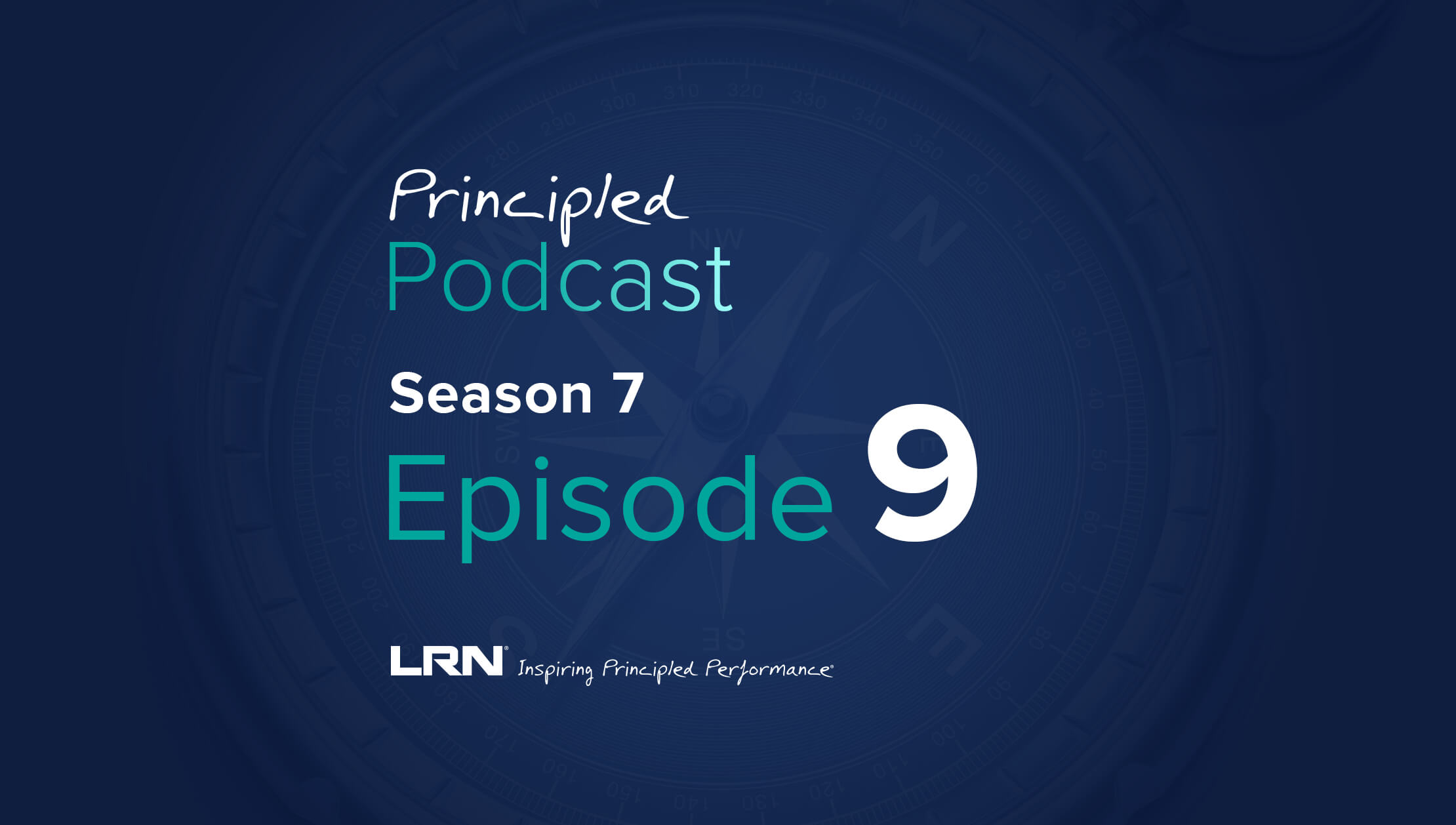What you'll learn on this podcast episode
Can we make diversity matter to everyone? If so, how can we overcome resistance to dealing with tough topics like racism and gender equality and really change people’s behavior? In this episode of the Principled Podcast, host Jen Uner talks with Senior Instructional Designer Felicity Duncan about a new LRN learning model and how it can drive behavior change to support diversity, equity, and inclusion initiatives. Listen in as the two discuss effective DEI training as well as Felicity’s recent work on the new LRN DEI Program, a comprehensive learning campaign that includes a range of essential microlearning assets.
To get a preview of the courses and curriculum included in the DEI Program, visit the DEI page on LRN.com.
Principled Podcast shownotes
- [1:26] - Why is behavior change particularly important when it comes to diversity, equity, and inclusion efforts?
- [4:57] - The three most common barriers to overcome when it comes to inspiring DEI behaviors.
- [7:51] - How does the LRN library approach the behavior change differently?
- [10:45] - Why empathy is so central in getting people to do the right thing.
- [15:02] - The importance of training.
- [16:51] - How empathy can be inspired on an online course.
- [21:09] - The core behaviors LRN’s new course focuses on.
- [25:45] - Leader-led learning and why it’s important.
Where to stream
Be sure to subscribe to the Principled Podcast wherever you get your podcasts.
Guest: Felicity Duncan, Ph.D.
Dr. Felicity Duncan, Senior instructional designer, believes that training and communication interventions have the power to transform behavior, including driving people toward more ethical treatment of those around them.
Felicity graduated with a Ph.D. in Communication from the University of Pennsylvania. After teaching at the college level for several years, she transitioned to workplace education to have a bigger impact on working adults by providing them with the training they need to truly thrive in their roles. At LRN, she is focused on developing high-impact, behaviorally focused content for the LRN Library. Her most recent project saw her working with the Library team to create a powerful new DEI Program that includes not only LRN’s world-class Inspire courses but also a set of microlearning assets designed to support, reinforce, and guide behavior change.
Jen Uner is the Strategic Communications Director for LRN, where she captains programs for both internal and external audiences. She has an insatiable curiosity and an overdeveloped sense of right and wrong which she challenges each day through her study of ethics, compliance, and the value of values-based behavior in corporate governance. Prior to joining LRN, Jen led marketing communications for innovative technology companies operating in Europe and the US, and for media and marketplaces in California. She has won recognition for her work in brand development and experiential design, earned placements in leading news publications, and hosted a closing bell ceremony of the NASDAQ in honor of the California fashion industry as founder of the LA Fashion Awards. Jen holds a B.A. degree from Claremont McKenna College.
Principled Podcast transcription
Intro: Welcome to the Principled Podcast, brought to you by LRN. The Principled Podcast brings together the collective wisdom on ethics, business and compliance, transformative stories of leadership and inspiring workplace culture. Listen in to discover valuable strategies from our community of business leaders and workplace change-makers.
Jen Uner: Creating a quality, diversity, equity, and inclusion program is a top concern of organizations today. Quality being key, how can we positively impact people's behavior? Can we make diversity matter to everyone? How do we overcome people's resistance to dealing with tough topics like racism and gender equality. Hello, and welcome to another episode of LRN's Principled Podcast. I'm your host today, Jen Uner, Strategic Communications Director at LRN. Today I'm joined by Felicity Duncan, a Senior Instructional Designer on the LRN Library Team. We're going to be talking about a new LRN library learning model and how it can truly drive behavior change to support DEI initiatives. Felicity has just completed work on the new LRN DEI program, a comprehensive learning campaign that includes a range of exciting micro-learning assets. Felicity, thank you for coming on the Principled Podcast.
Felicity Duncan: Thanks, Jen. I'm excited to be here.
Jen Uner: Just to get us started, I know that for corporate legal operations folks, according to a 2021 survey that I read about recently, standing up a DEI program was really one of the top priorities of 2021. And it certainly was born out by our own traffic to our own website, the things that people were searching for. And so, I'm really excited to see LRN respond to that interest by expanding the offering that we have for our audiences. My first question for you is since you've just worked on this new program expansion, why is behavior change particularly important in the context of diversity, equity, and inclusion efforts?
Felicity Duncan: Well, with a lot of ENC issues, there's so much companies can do in terms of processes that sort of takes the guesswork out of achieving compliance. So if you think about something like, know your customer, the company can establish 10 steps to follow and they could be very well defined. And if employees do that, great, you're compliant, you have no worries. When it comes to something like DEI, what really matters is the quality of interactions among the people in your company. So those thousands of little moments between people and the reality is, just you can't create processes for that, right? You can't give people 10 steps to having perfect communication every time. You have to inspire people to reevaluate how they're treating others and decide to do better every day. So DEI efforts rely on the actions of every single employee.
And as we probably all know from our own experiences in our careers, if you have one bad apple that was really going to spoil a bunch in a DEI context. So the goal of DEI training has to be to get everybody on board with the ideas behind DEI, and committed to behaving in ways that are consistent with building a great inclusive workplace. So, it's all about behaviors that are not necessarily clearly defined. And it's about everybody behaving in those correct ways every day and in every interaction. So behavior is completely central to DEI in a way that it is not necessarily in these more process-based compliance issues.
And another point is that behavior change is really hard to measure in a DEI context, partners often ask, how can we measure the impacts of our training? How can we be sure that it's working? And in a DEI context, that can be really difficult because again, we can't create a list of very specific measurable behaviors. So your company might want to see respectful communication, but what does that actually look like? How can a manager monitor it? How can you record it? So the idea of behavior is just really central to DEI. And it's also one of the hardest nuts to crack both from the perspective of defining those behaviors from the perspective of measuring them and from the perspective of inspiring them.
Jen Uner: And yet, we know from our own benchmark of ethical culture survey, that the most ethical companies, the ones with the best behavior, they see up to 40% lift in key business metrics like employee loyalty, customer satisfaction, innovation, growth. So, I mean, it's clearly, it's really important. What are some of the biggest challenges we have to overcome when it comes to inspiring DEI behaviors?
Felicity Duncan: Well, actually what you just said there links to my first point here, and that's, some people don't necessarily see the value of DEI. They don't see how it connects to the bottom line. So there's a lot of people out there who are really focused on the bottom line performance, business goals. And for them, it's not always easy to see what role DEI can play in achieving those. And so things like you've mentioned there, the impacts on employee satisfaction, the impact on performance productivity, all of that is really important, and is the way to overcome that challenge is to really underscore that for people taking our training and actually our DEI introductory course called Diversity Equity and Inclusion, that actually starts off with a section that just explains the value of diversity and what it can do for teams and how it can contribute to success and explains that right upfront to try to overcome that barrier.
Another very common barrier that we see is, there are people who would prefer to believe that things like racism and sexism are in the past, right? They don't want to acknowledge that this is an ongoing reality because it's a difficult and ugly thing to face, right? And that's why we found in our training, it's so important to use testimonials and stories to show this is a real problem, and it's happening to real people right now. And I think a third challenge that we have to overcome is, that some people think that as long as they aren't doing anything that is explicitly problematic. So they're not harassing other people. They're not saying inappropriate things.
As long as they're doing these things, they don't have to worry about DEI, right? They don't see a need to necessarily engage in positive behaviors that promote DEI. And that's why our training really tries to focus on the role that everybody can play no matter who they are. And to explain why it's so important that everybody gets involved in creating a positive DEI environment. Because as I said, it's not enough not to do wrong, you have to do good because those behaviors, those active behaviors every day are what underpins successful DEI programs.
Jen Uner: Yeah. Actively do good, really focuses then on outcomes, right? And it's about how things land with others. And I think that's why it is important to know even the most well-intentioned person doesn't even necessarily know where they may be doing something or saying something that is not well received by the audience around them. So I think it does change, good training, I think does change behavior because it introduces sensitivities and promotes empathy in a way that I think doesn't really happen with any other sort of training offered by corporate programs at this point. So for us, what makes the LRN library approach to behavior change different?
Felicity Duncan: Well, I think, and this circles back to what you were just saying, that one of the things that makes our program different in our approach to behavior change different is, we really focus on helping people understand where bias comes from, right? That essentially everyone has biases you, me, everybody, because it's part of how our brains work. They're programmed to use heuristics, to shortcuts things like stereotypes, to make quick decisions, right? And that's actually a good thing. It keeps us safe, right? If you see a large shadowy figure in a dark alleyway, the right thing to do is to run away. You don't want to stop and take time to evaluate whether the person there is dangerous or not. And so essentially being human means that our brains are running on the software that evolved millions of years ago and never got updated, but that doesn't necessarily work well in our complex modern world.
And so even if you have the best of intentions, even if you are a quote-unquote, good person, you can't help having biases and you can't stop having biases. But what our courses really try to say is, like you can manage those biases, right? You can avoid letting your biases affect the things you say and do in the workplace and the decisions that you make, right? So it's not about being a good person or a bad person, having good intentions, having bad intentions. What it's about is being aware of your own biases and managing them so that you don't have a negative impact on the people around you. Another important part of our approach is about putting a human face on the issue. We really try to get learners to see how these issues, so things like racism or anti LGBTQ plus bias, how they affect real ordinary people.
We want our learners to think about DEI in human terms, rather than in political or economic terms. It's about people and it's about how people treat one another. I'd also say we try to talk to everyone. We try to talk to people who are perhaps being targeted by problematic behaviors. We talk to people who may be guilty of doing things in the workplace that are inappropriate. And we also talk to people who are by stand and who see things happening, and maybe don't say anything. So we want to create a role for everybody in creating a DEI environment whether it's changing your own behavior, speaking up when you see a problem, reporting your own negative experiences, it's truly like a 360 degree take on behavior. And so all of this actually, I could summarize by saying that our approach is really strongly rooted in empathy, and that that's the core driving value behind how we see the process of inspiring positive behavior change.
Jen Uner: And so why is empathy so central to getting people to do the right thing?
Felicity Duncan: Wait, if you think about it, right? Empathy is the unique human ability to take an imaginative leap, right? And really put yourself in somebody else's shoes, really understand what life can be like for somebody who isn't you. Okay. And so in a DEI context, if you can start to really understand what life is like for somebody who has to deal with microaggressions every day or somebody who's getting passed over promotion for promotions repeatedly because of who they are, when you really understand other people's reality, you can start to find the will to change things. You can realize how your actions, simple actions from you could transform other people's experiences. And that helps you feel empowered to really make a difference. But from the LRN perspective, we're not only talking about people who lack a DEI mindset, finding empathy for others.
We're actually talking about sort of 360-degree empathy. And that starts with empathy for the learner. So when we design our courses, we start by thinking about our learners as human beings and trying to believe the best about them. A lot of DEI training can be quite, almost aggressive saying, this is wrong. This is wrong. These are bad behaviors. And that's sort of natural, right? Because things like racism, things like sexism are terrible and they are wrong. But if you're trying to inspire people to behave better, then taking that perspective towards your learners is just not going to work, right? People are going to become defensive if you start with that approach and there's no space there for inspiring positive change, right? So we start with empathy for the learner and that really models the empathy that we want to inspire. And then of course, we try to inspire empathy in our learners.
And that means empathy for one another no matter who. And this is something that can be a little difficult, but what we're talking about here is not only empathizing with the person who's being targeted by say for example on microaggression, it also means empathizing with the person who's responsible for the microaggression, right? Understanding, look, maybe they really do think it's just a joke, and that's why they've become so defensive. Okay. Because when you get to the point where people can really understand one another's perspective, that opens up space to move forward, right? When you can truly say, look, I understand, you think it's a joke, but it's not a joke to her. And that matters. You've hurt her feelings. You need to make that right. No matter what your intentions are. That's the point at which positive behavior can emerge. Nobody needs to be defensive. Nobody needs to be afraid. We can all instead rather work together out of a place of understanding to improve the context and the environment around us. So really empathy is at the heart of inspiring that positive change.
Jen Uner: I love what you said about space to move forward. I think that is a really important aspect of progress and change, right? If we're just throwing up walls and problems, we're not going to be able to move forward. We're not going to be creating a culture of respectful communication, which is vital.
Felicity Duncan: And it can be really difficult, right? If you're in a workplace environment where you're sitting down to some DEI training and you're thinking about, my colleagues, so and so who keeps saying all these terrible things, it can be difficult to try and come to a place where you empathize and understand that person's perspective, but we really are engaged in these human relationships in the workplace. And if we don't have that empathy, we don't have that understanding. We really can't have authentic connections and we can't explain to one another how we can do better. There's just no openness and no trust in those environments, and without that there's really no possibility for improvement. So, I mean, empathy, sometimes people think it's a bit of I don't know, like a wooly concept or a touchy-feely concept, but it's really practical. It's really the foundation for creating a positive environment where people can work together effectively.
Jen Uner: It really is very important. One of the things that we say it's somewhere on our website, I can't exactly remember where, but that, at LRN at our core, we do believe that people generally most all people and certainly people that made it through the vetting process to get into your company, do want to do the right thing, people do want to do the right thing. They may not be equipped necessarily. They may not have gone through the work to examine, how are they really comporting themselves in society. So I think that, making that space and arming people with the tools to help assess and evaluate their own behaviors and not just, I'm not trying to say judge others, but are actually aware of what they're doing. I think it's a really good thing that people can use, not just in the workplace, but in their life in general.
Felicity Duncan: Yeah. And you said earlier, like what can training do, right? If we're talking about treating other people like decent human beings, you'd sort of hope somebody learned that when they were a child, right? But what training could do is what you just said there and can really explain to people like, you might think this is okay, but here's why somebody else might think it's not okay. And here's why that matters, and here's why you need to consider other people. And not just assume that your perspective is the only perspective, right? It's really good opportunity to open up how people are thinking about things, because, if you are, maybe an environment where you're not being exposed to a lot of new ideas about sort of DEI issues, you can get trapped in these routine ways of thinking and training can help you break out of it. So I think there's a really important role for training, even in something that might be as hard to define or hard to pin down as building empathy and inspiring kindness in respect, right? Training can still play a role in that.
Jen Uner: And so how can we and inspire empathy in an online course?
Felicity Duncan: Yeah. People sometimes can think about online courses in a sort of flat way, right. But in fact, you can do in an online course, what you can do in any other context. And one of the most powerful ways that we've found to inspire empathy in our courses is through compelling stories, right? Because stories are really just stories are how human beings understand the world. That's how we learn all our sort of sense of morality, stories are really powerful. And so we try throughout our courses to really leverage the power of stories, to inspire these feelings and this type of understanding. So for example, I'm thinking now of our LGBTQ plus course, our anti-racism course, our microaggressions courses.
In all of those courses, we have sort of confessional style videos where real people, real ordinary people share their experiences with things like microaggressions in the workplace, with racism, with dealing with the fallout from agenda transition, they just share these really personal narratives about what's happened to them, how they feel about it, what they think about it. Watching stories like that, stories that, you person in an office taking a training, you might not really be encountering in your day to day life that can really start to humanize the issues that we're talking about.
As I said earlier, like put a human face on it and start to inspire you to think about maybe very difficult to alluded concepts, like racism in these more human terms and in terms of the stories of the impact that they can have on regular folks. And that way, you can inspire empathy even in something that you might not traditionally think of as being a powerful tool for that, like an online course. And I think that in our new sort of revamped DEI program, we've done a really good job of leveraging those kinds of testimonials, those kinds of stories, as well as narratives like real-world scenarios, where you can apply your knowledge and things like that, leveraging all of that to achieve these goals of building, understanding, inspiring empathy, helping to humanize issues. And out of that ultimately encouraging people to behave better to one another.
Jen Uner: Those first-person stories are very powerful. It really provides I think, excellent context, especially if you haven't been exposed to those things and not everybody has, I've grown up in very multicultural places and have seen firsthand microaggressions for example, or the ways that people are just, things are assumed about people and slights are made. And I think that having those first-person stories, just to kind of remind folks about those moments and how prevalent that kind of behavior still is. I think it's really powerful to put that in context of the training right there, right at the moment that you're in a moment to learn. So I want to commend you guys on our learning design team for bringing those real stories to the forum in this training.
Felicity Duncan: No, you're right. And I think you make an important point there is that, everyone is coming to the training with different experiences, right? So some people might have had the experiences you've had, where they are in diverse contexts and they've seen these things happening, but there are people out there who haven't necessarily had the opportunity to hear a lot of these types of stories. And so by having these narratives upfront and by sharing these like sort of really intimate stories, we create this shared understanding among everyone who comes to the training, no matter where they're coming from, what their background is, we can all sort of understand these human stories and that's a great foundation to build on in the rest of the learning where you can say, look, we've understood this. We can see how this impacts force around us. What can we do? Right? Like what are practical things we can do? What are some of the steps that we can take to improve the situation so that, no one has to go through this again.
Jen Uner: So what are some of the core behaviors that our new inspire courses are focused on?
Felicity Duncan: Yeah, a great question. And I think, again, as we said, right at the beginning it comes to DEI. It is really all about behavior. And so we have tried to define a set of behaviors that are really broadly applicable, that are the core things we want people to do after they've taken one of our training courses, whichever it is, whether it's microaggressions or our introduction. So the first thing is really being aware of and managing biases. So beginning there, I started talking about, we all have by biases, you can't help it. You're a human being. You're a member of homo sapiens sapiens, that's it, you come with biases, right? But if you are aware of that, you can manage it. If you are willing to evaluate your own biases and just sort of be real with yourself about that, you can manage them so that they don't impact the people around you so that you're not making decisions or taking actions or saying things from your biases that you're actually giving your conscious mind an opportunity to get involved and not letting your biases control you rather you controlling your biases.
The second key behavior we emphasize over and over again, is the idea of the pause and reflect, right? Pause and reflect before you make a decision. Pause and reflect before you say something that might be problematic. It's such a simple thing, but just taking two seconds to stop yourself before you decide something, before you say something and say to yourself, how could this land with somebody else?
Is this decision based on the facts or is it based on something else, right? Just interrogate yourself, get curious about your own motivations and your own behaviors. And just by doing something simple like that, I think it can have just such a powerful effect on how you show up for the people around you. The third core behavior we will look at, and it might sound a little wooly, but it's treating other people like people, treating everyone around you like a human being, right?
Sometimes we're busy at work and there's pressure and there's deadlines. And we can tend to treat people around us as a means to an end, instead of really seeing them as a person and treating them as a person. And just that simple behavior can really undermine and destroy any kind of aggression or harassment in the workplace. Just saying like, this is a person that I'm talking to, I should have talked to them like a person. A very practical behavior that we really want to see coming out of the training is the idea of speaking up when you see something wrong, companies really rely on people to speak up when there's a problem, especially when it comes to something like DEI, right? If we're talking about a team that where maybe there's one person who has some problematic behaviors, no one is going to know about that in the HR department, unless somebody speaks up.
So the problems cannot be addressed in the absence of reporting or speaking up. And so we constantly, throughout all of our DEI courses, we say, look, we know it's scary. We know it can feel really risky, but speaking up is a really practical thing that you can do that is going to have a direct impacts on the quality of our workplace. And that can really allow your organization to deal with the problem limbs that exist. Because if they don't know about them, they can't do anything.
And I think the last behavior and something that I'm surprised I haven't mentioned up to this point, is the idea of allyship being an ally, right? It's quite a buzzword right now you hear a lot about allyship, but in practical terms, what it means is supporting, listening, learning, being there, being a part of the journey and helping the people around you when they're facing tough times. And in a DEI context, being an ally is a way that anybody, no matter who they are, can sort of take an active role in promoting the kind of culture that we're trying to create. That organizations are trying create, right? You can be there for people around you. You can do your own work, do your own learning, and really just be somebody positive in the workplace instead of just being somebody neutral in the workplace.
Jen Uner: Be a positive force. I love that. In a recent session, you were talking about leader-led learning. And I think this came in the context of the new assets that we've created for program managers around communicating around the programs, the learning courses, and delivering them and creating opportunities for conversation. Can you just tell me a little bit more about leader-led learning and why that's important?
Felicity Duncan: Sure. So leader-led learning really comes down to the idea that, it can be really powerful if you see the person you report to everyday, taking something seriously and trying to guide you and inspire you around that behavior or whatever the case may be. It's saying you respect your leaders, whether it's your team leader or your CEO, whoever it is, you respect that person. You want to impress them. You want to support them. And if they take an active part in learning, that can be incredibly powerful, that can help people recall more. It can help people take the learning more seriously. It reinforces the messages of the learning and it just really strengthens the learning experience. And so as part of our DEI program, one of the things that we created was an asset that is an opportunity for teams and, small teams. It doesn't have to be sort like a company-wide thing, but for you, your small individual team to have a conversation about a DEI topic in a setting that is guided.
So there's guided, there's suggested questions. There's a framework that you can use to have the discussion, but really gives your team and your team leader, an opportunity for leader-led learning where the team leader can sort of ask the questions, prompt the discussion, and it can do a lot of things, right? That can just promote the simple idea of talking about DEI issues, which is really intimidating to a lot of people. It can highlight how important these issues are to your team, to your team leader and to your organization.
And it can give everyone the sense of confidence that if they want to speak up, that they're going to be supported, that this is an open conversation that's happening in their workplace. And that this is something that matters and it's something that's live, it's a live area of concern for their leader and something that need to take seriously. So we're very excited about that sort of taking the learning outside of the online context rather, into the actual dynamics of the team and giving the team an opportunity to sort of trial run this idea of engagement and empathizing with one another and just talking about tough topics.
Jen Uner: Yeah. Felicity, this is a conversation we could continue to have, I think all day. I mean, it's really clear that if you want to be the change, if you want to see in the world, it starts with you. And I'm glad that we are creating the tools to help organizations have a positive impact and create a speak-up culture and a culture of respect and trust and belonging. Is there any parting thing you want to share with me? Anything I didn't get to ask you about before we go?
Felicity Duncan: No, I would just say, it's great as you pointed out earlier, it's really an interesting time when DEI is something that's top of mind for organizations against a backdrop of sort of difficulties with talent retention and shortages of workers, that nothing is very important than creating a great culture, a culture that people want to participate in, a culture that works. And something like the LRN DEI program can play a really powerful role in promoting that, in supporting that and in inspiring that. So it's great to have the opportunity to talk this through. And I hope that organizations everywhere are thinking about what they can do to create better environments for their workforce so that they can really, achieve all the things you mentioned earlier, like better productivity, happier people, a more engaged and engaging culture, and ultimately, better success in their business goals.
Jen Uner: Absolutely, retention, such a huge topic right now with a great resignation going on. And it's clear that toxic work cultures are like the number one reason why people are leaving. So I'm glad that our offerings, our services and our experts are helping to create more positive and more ethical workplace cultures. Felicity, thanks again for joining me on this episode. My name is Jen Uner, and I want to thank you all for listening to the Principled Podcast by LRN.
Outro: We hope you enjoyed this episode. The Principled Podcast is brought to you by LRN. At LRN, our mission is to inspire principled performance in global organizations by helping them foster winning ethical cultures rooted in sustainable values. Please visit us at lrn.com to learn more. And if you enjoyed this episode, subscribe to our podcast on Apple Podcasts, Stitcher, Google Podcasts, or wherever you listen. And don't forget to leave us a review.
Be sure to subscribe to the Principled Podcast wherever you get your podcasts.
















